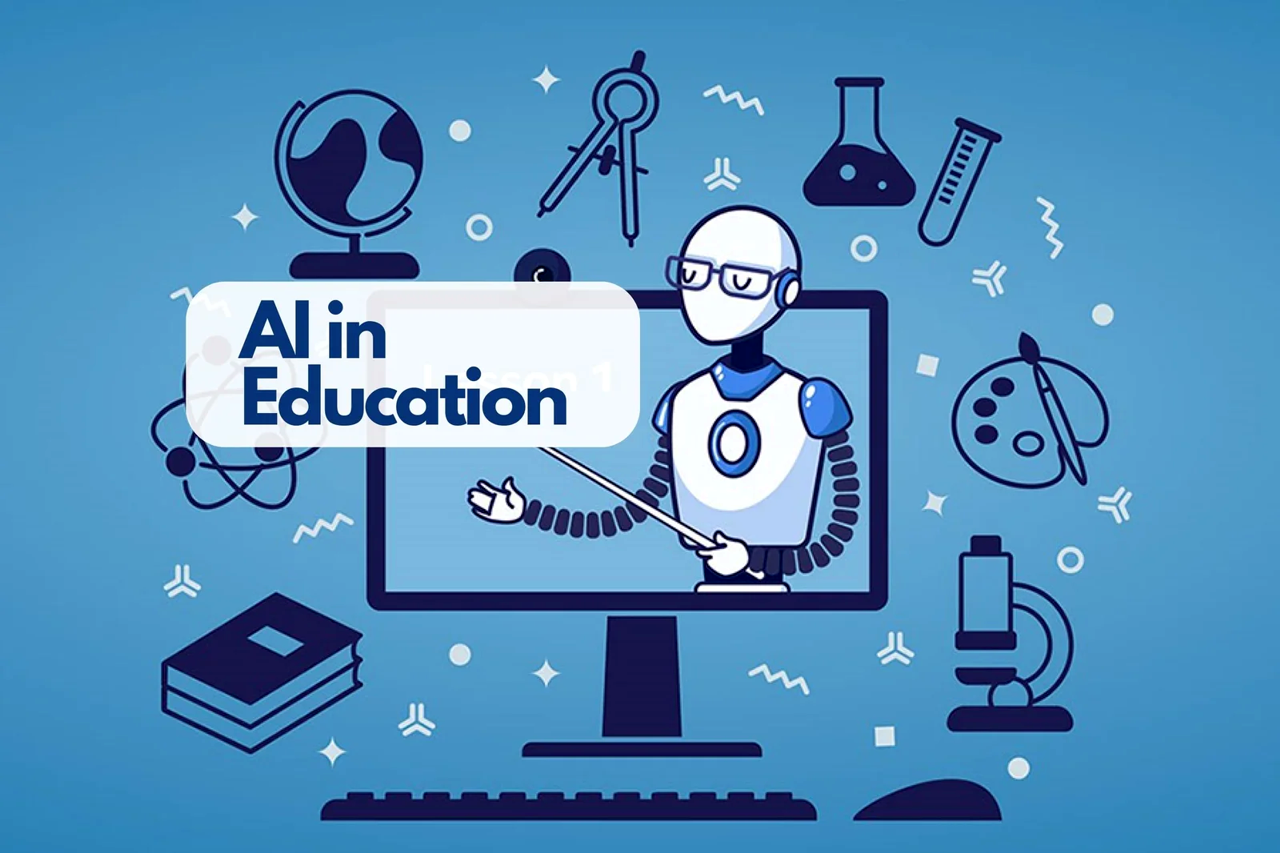
In today’s rapidly evolving technological landscape, artificial intelligence (AI) has emerged as a powerful tool with the potential to revolutionize various industries, and education is no exception. By harnessing the capabilities of AI, educators can create more personalized learning experiences, enhance student engagement, and support teachers in delivering high-quality education.
Read More: The Role of Tech in UK Education: Opportunities and Challenges
Contents
Introduction to AI in Education

What is AI?
Artificial Intelligence, commonly known as AI, refers to the simulation of human intelligence processes by machines, especially computer systems. These processes include learning, reasoning, and self-correction. In the context of education, AI technologies are designed to mimic human cognitive functions to facilitate learning and teaching processes.
Importance of AI in Education
The integration of AI in education holds immense significance in addressing the diverse needs of learners and educators. AI-powered tools can analyze vast amounts of data to provide personalized learning experiences, identify areas for improvement, and streamline administrative tasks, ultimately enhancing the overall effectiveness of education delivery.
AI Applications in Education
Personalized Learning
One of the most significant benefits of AI in education is its ability to personalize learning experiences for individual students. By analyzing students’ learning patterns, preferences, and performance data, AI-powered systems can deliver customized content and adaptive learning paths tailored to each student’s unique needs and pace of learning.
Intelligent Tutoring Systems
AI-powered tutoring systems leverage machine learning algorithms to provide students with personalized instruction and feedback. These systems can assess students’ knowledge gaps, learning styles, and progress in real time, offering tailored learning materials and guidance to help them master difficult concepts effectively.
Grading and Assessment Automation
AI algorithms can streamline the grading and assessment process by automatically evaluating assignments, quizzes, and exams. By analyzing students’ responses against predefined criteria, AI systems can provide accurate and consistent feedback, saving teachers valuable time and effort that can be redirected toward more meaningful interactions with students.
Enhancing Student Engagement
Interactive Learning Platforms
AI-driven interactive learning platforms leverage gamification, simulations, and multimedia resources to engage students actively in the learning process. These platforms adapt content and activities based on students’ interests, preferences, and performance, making learning more enjoyable, interactive, and effective.
Virtual Reality and Augmented Reality
Virtual Reality (VR) and Augmented Reality (AR) technologies create immersive learning environments that enable students to explore complex concepts in a hands-on manner. By simulating real-world scenarios and interactions, VR and AR experiences enhance students’ understanding, retention, and engagement, particularly in subjects that require spatial visualization and practical application.
Supporting Teachers
Automated Administrative Tasks
AI technologies can automate routine administrative tasks such as scheduling, grading, and attendance tracking, allowing teachers to focus more on instructional planning, student support, and professional development. By reducing administrative burdens, AI empowers teachers to allocate their time and energy more efficiently, thereby improving overall teaching quality and job satisfaction.
Customized Teaching Materials
AI-powered content generation tools enable teachers to create customized teaching materials that cater to students’ diverse learning needs and preferences. These tools leverage natural language processing, machine learning, and multimedia capabilities to generate interactive lessons, quizzes, presentations, and educational resources tailored to specific learning objectives, standards, and student populations.
Addressing Learning Disabilities

Adaptive Learning Platforms
For students with learning disabilities or special needs, AI-powered adaptive learning platforms offer personalized support and accommodations to facilitate their learning process. These platforms dynamically adjust the pace, format, and content of instruction based on individual learners’ strengths, weaknesses, and progress, ensuring equitable access to educational opportunities and academic success.
Speech Recognition for Dyslexia
AI-driven speech recognition technology assists students with dyslexia or other reading difficulties by converting spoken language into text and providing real-time feedback and corrections. By transcribing spoken words accurately and efficiently, speech recognition tools enable dyslexic learners to overcome barriers to reading, writing, and comprehension, promoting their academic achievement and self-confidence.
Overcoming Language Barriers
Translation Tools
AI-powered translation tools facilitate communication and collaboration among students and educators from diverse linguistic backgrounds by providing real-time translation of lectures, textbooks, assignments, and instructional materials. These tools support language learning, cultural exchange, and global collaboration in educational settings, fostering inclusive learning environments and equitable access to knowledge and opportunities.
Language Learning Applications
AI-driven language learning applications leverage adaptive algorithms, natural language processing, and speech recognition technologies to personalize instruction and practice exercises for language learners of all proficiency levels. These applications offer interactive lessons, pronunciation practice, vocabulary drills, and language immersion experiences to enhance learners’ language acquisition, fluency, and cultural competence effectively.
Ethical Considerations in AI Education
Data Privacy
As AI systems collect, analyze, and process vast amounts of sensitive student data, ensuring data privacy and security is paramount to protect individuals’ confidentiality, autonomy, and rights. Educators, policymakers, and technology developers must implement robust data protection measures, transparency practices, and consent mechanisms to safeguard students’ privacy and maintain trust in AI-enabled educational environments.
Bias in Algorithms
AI algorithms may exhibit biases or disparities in their decision-making processes due to inherent biases in training data, algorithmic design, or human input. These biases can perpetuate stereotypes, inequality, and discrimination, leading to unfair outcomes, marginalization, and harm, particularly for vulnerable or underrepresented groups. To mitigate bias in AI education, stakeholders must conduct bias audits, diversify data sources, and promote algorithmic fairness, accountability, and inclusivity in AI development, deployment, and evaluation processes.
Future Trends and Possibilities

AI-Powered Classrooms
In the future, AI is expected to play an increasingly integral role in transforming traditional classrooms into intelligent learning environments that adapt to students’ needs, preferences, and progress. AI-powered classrooms may feature intelligent virtual assistants, personalized learning pathways, real-time feedback mechanisms, and predictive analytics to optimize teaching and learning experiences, foster collaborative inquiry, and empower lifelong learners to thrive in a rapidly changing world.
Lifelong Learning Support Systems
AI-driven lifelong learning support systems will empower individuals of all ages and backgrounds to acquire new knowledge, skills, and competencies throughout their lives to adapt to evolving societal, economic, and technological trends. These systems will offer personalized learning pathways, micro-credentials, competency-based assessments, and career guidance services to facilitate continuous learning, professional development, and career advancement in the digital age.
Read More: The Role of Education in Sustainability
FAQs:
- How does AI personalize learning experiences for students? AI analyzes students’ learning patterns, preferences, and performance data to deliver customized content and adaptive learning paths tailored to individual needs and pace of learning.
- What are some examples of AI applications in education? AI applications in education include personalized learning platforms, intelligent tutoring systems, grading and assessment automation, interactive learning environments, and language learning applications.
- How can AI support teachers in their roles? AI can automate administrative tasks, assist in creating customized teaching materials, provide personalized feedback and support to both teachers and students and offer professional development opportunities.
- What ethical considerations are associated with AI in education? Ethical considerations include data privacy, bias in algorithms, transparency and accountability, equity and inclusivity, and ensuring responsible and ethical use of AI technologies in educational settings.
- What are some future trends in AI education? Future trends include AI-powered classrooms, lifelong learning support systems, adaptive learning environments, real-time analytics and feedback mechanisms, and collaborative and experiential learning approaches.
The Final Words
Artificial Intelligence has the potential to transform the learning experience by personalizing instruction, enhancing student engagement, supporting teachers, addressing learning barriers, overcoming language barriers, and promoting ethical and inclusive educational practices. However, to realize the full benefits of AI in education, it is essential to address ethical considerations, mitigate biases, and foster responsible innovation, collaboration, and empowerment among all stakeholders, ensuring equitable access to high-quality education and lifelong learning opportunities for all.







